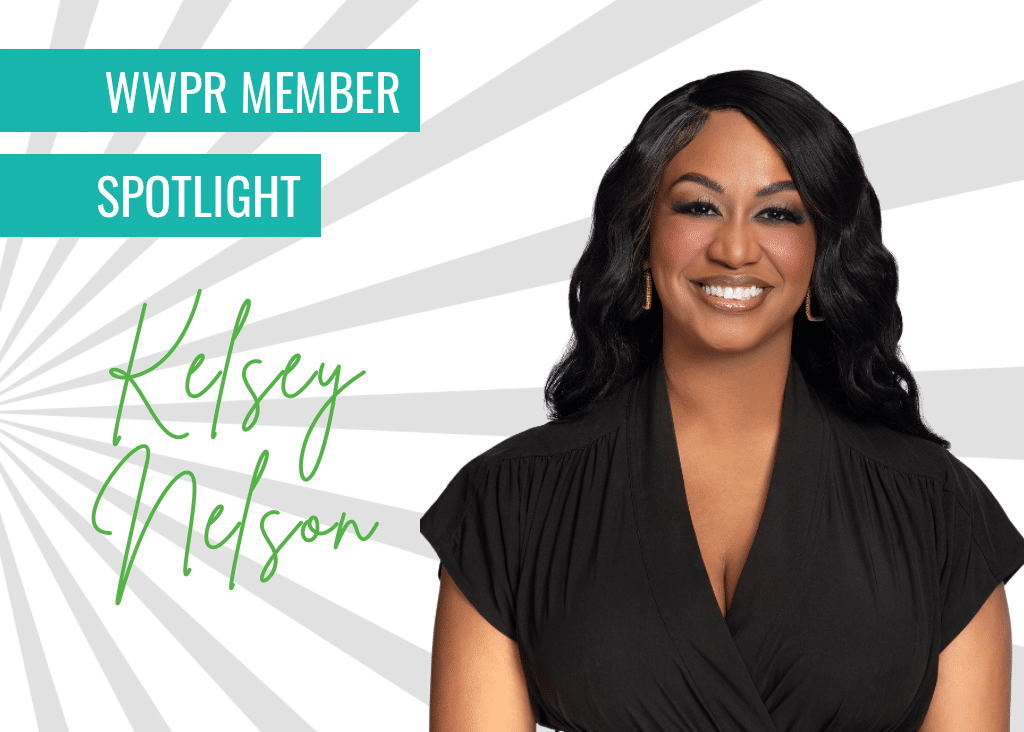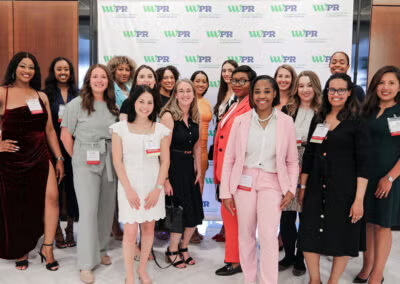Member Spotlight: Kelsey Nelson

Written by Kimberly McGuire
Kelsey Nicole Nelson is a broadcast media personality and the founder, executive producer, and host of the “Listen in with KNN” sports talk podcast and radio show. She also is the Social Media and Digital Marketing chair for the Entertainment and Sports section for the Public Relations Society of America (PRSA). And she most recently served as the Vice President and Membership Chair of the Washington Association of Black Journalists. Today, she is on the Regional Advisory Council for the Tickets for Kids nonprofit and the Period Reality Advisory Board, and sits on the board of the Capital Emmys—where she serves as the Communications Committee Co-Chair—and the Montgomery County Sports Hall of Fame.

Your work draws people into amazing stories, but we would love to flip the script—how has your personal journey shaped your professional path?
I was born and bred in the Washington, D.C., area, which is special because sports are everywhere. I grew up going to games with my dad—seeing Georgetown basketball legends, watching the University of Maryland win championships, and going to the Baltimore Ravens’ training camp. Both my dad and mom worked so hard, which is where I get my work ethic from, but they always made time to take me to games and practices. This area has a unique culture, especially in sports, and I’ve been lucky to build a career in sports journalism here, where I can share athletes’ stories with audiences. Sports also have a special meaning to me because I spent many summers with my grandparents in Jackson, Mississippi, and the South is all about religion and football. When I wasn’t in church, I was playing football with other kids and having fun. Faith, family, and football paved the way for me, and now I’m so grateful that I can pave the way for others.
As you built your personal brand, what values or priorities mattered most to you? Were there any guiding principles that helped you stay true to yourself?
You have to have non-negotiables in life, and for me, those are trust and respect, which are what I built my brand on. Whether it’s people sharing their story with me, employers relying on me, or students learning from me, I want everyone I engage with to trust me. And I want to be respected for the work I do, but I’ve had to earn it, especially as a Black woman working in sports communications and the entertainment industry. I’ve earned the trust and respect of many because of my work ethic. I work hard on all that I do—I give 150%—and people know that. So, when they see the KNN brand, they know they will get a quality product. That’s important to me, especially as my brand has become increasingly more global, and I never know who is watching. And with everything I’m involved in, I always remember to stay true to myself—not get caught up in the hype and headlines—and to be humble, grateful, and thankful.
When you set your intentions for your brand, how did that shape the kinds of opportunities or roles you went after? Did it open doors you had not expected?
The cool thing about trust and respect is that you get what you give, and because a lot of my business is referral-based, it means that my values and other things I hold near and dear to my heart are seen and felt by others. I focus on being a good person with a strong work ethic and on making the people I meet or work with feel welcome. I’m always smiling and want to make other people smile, which is one reason I ended up loving nonprofit work. I was a Boys & Girls Club kid, which is how I went to my first professional sports game, so being able to give back now is a beautiful thing. I’m also on the Advisory Council for Tickets for Kids, which gives free sporting and concert tickets to children and families. I’m so glad I get to help and mentor younger generations, and I’m thankful for the opportunities I’ve had, such as in radio and podcasting, which unexpectedly led me to find joy in teaching and public speaking. Being able to use my platform for a purpose fueled by my passions is amazing, and I try to do so every day. I’ve seen life come full circle.
As you use your platform for a purpose, how do you approach using communications as a tool for positive change, both for yourself and the causes you care about?
My biggest thing is giving back. So, I’m most proud of the internship and fellowship programs that I have through my companies. I have a lot of people come to me, unsure about this job market and how to use their skills, and I focus on helping them get real-world experience and build their portfolios. I also truly enjoy getting to know them and just talking about life—I think that’s important. For example, while covering Super Bowl LX, one of the greatest joys I had was the conversations with one of my interns, Anfisa Pitchkhadze, who is a senior at San Jose State University and was out there working as a student journalist and thriving. To me, it doesn’t mean anything if you get to the mountaintop alone, which is why I like to lift people up as they climb. Especially in the communications industry, which has been greatly impacted, to be able to provide support to young people in their careers—that’s my “why” and the kind of legacy with a lasting impact that I want to have.
You are a source of inspiration for so many women in public relations. Are there any women—past or present—who have inspired you along your journey?
It’s honestly all the women around me. In Washington, D.C., women make up more than half of the workforce, and over half of the top executives are women. This is more than any other municipality in our country and something we should take pride in. It’s amazing how many rock-star women I met through organizations like the Greater Bethesda Chamber of Commerce, DC Chamber of Commerce, Women in Sports and Entertainment (WISE) D.C., and Washington Women in Public Relations (WWPR), as well as local leaders I’ve gotten to know and living in a city like D.C. where we have been led by a highly successful woman in Mayor Muriel Bowser. How can I not be inspired? There are so many women doing great things—doing them effortlessly and graciously. But the most inspirational superwoman, for me, is my mom. She always worked so hard but was always there for our family. I’m so grateful for her, for how supportive she is of me and my career, and for how she’s adapted to multiple roles while my father works to get back to full health.
Reflecting on your career and your role as a lecturer at George Washington University, what is the most meaningful advice you share with students or women starting out in their careers?
Be your biggest promoter. You are your own self-marketer. We live in a world where nothing is guaranteed, so knowing how to market and brand yourself is very important. And you can’t wait for someone else to do it for you. Start now. Don’t wait and stand in the shadows. Instead, be a go-getter, be curious, and embrace that entrepreneurial mentality. If you have that mindset, it won’t steer you wrong. But also remember to have fun while you do. We live in such a serious world that you need to find things to laugh at throughout the day. Every day, find something that brings you joy or makes you smile. For me, it’s my students who make me smile—I love being in the classroom and talking with them about things like entrepreneurial journalism and how we see journalism evolving.
On the topic of advice (and just for fun), what are your top five favorite things that you would recommend to our WWPR community?
First is the 2027 NFL Draft coming to Washington, D.C., which is putting our city in the spotlight for a good reason. Second are concerts because I love live music. There are so many great artists coming to the area, like Cardi B, so it is definitely something people should take advantage of. And because I am a foodie, my third-favorite thing is our local restaurant scene. I always appreciate a good social hour and helping the local economy, and a great restaurant I just tried is GAIA Supper Club (and love it!). On the topic of food, fourth would be getting popcorn at the movie theater—I love going to see scary movies, especially those based on a Stephen King book. I’ve always lived close to a movie theater, and because I don’t drive, I enjoy the walk to and from there. That leads to my fifth favorite thing—getting out to walk, as it’s the one time in my day that’s purely for me and my thoughts, where I give myself grace and space.




